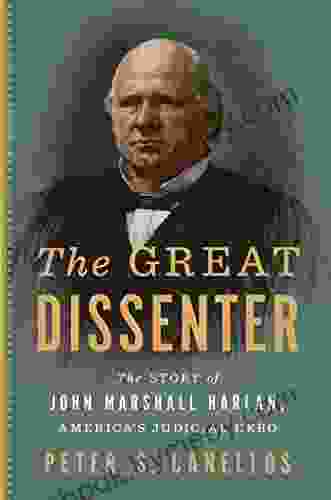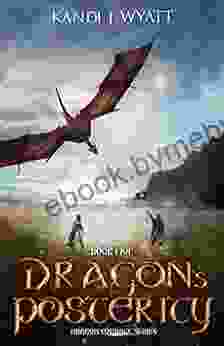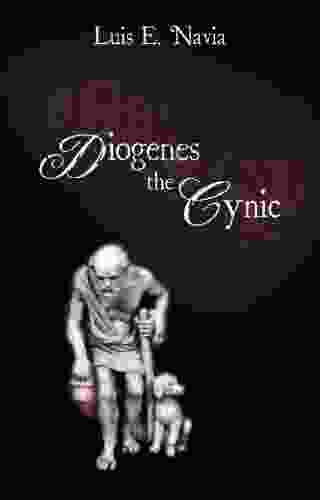John Marshall Harlan: America's Unsung Judicial Hero

4.8 out of 5
| Language | : | English |
| File size | : | 58901 KB |
| Text-to-Speech | : | Enabled |
| Enhanced typesetting | : | Enabled |
| X-Ray | : | Enabled |
| Word Wise | : | Enabled |
| Print length | : | 620 pages |
| Screen Reader | : | Supported |
A Legacy of Justice and Dissent
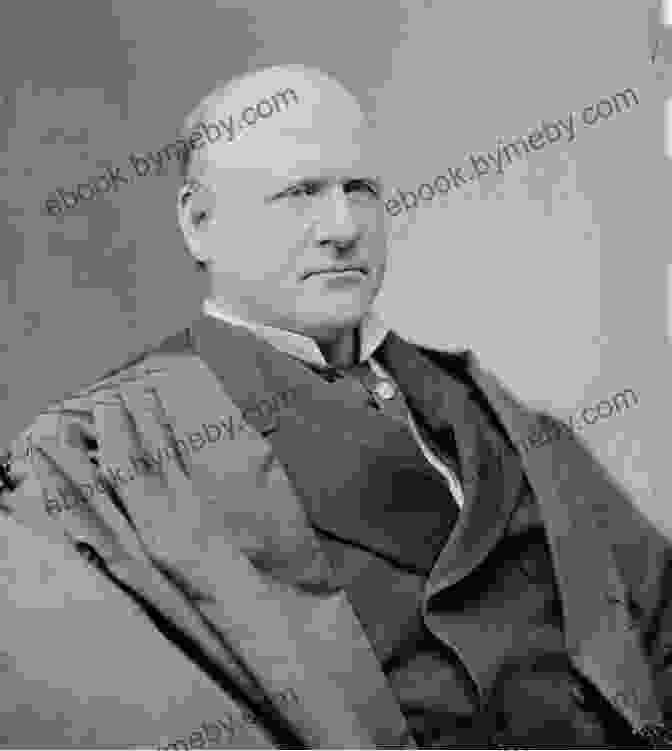
In the annals of American history, the name John Marshall Harlan stands tall as a beacon of justice and equality. As an Associate Justice of the Supreme Court during a tumultuous period of racial strife, Harlan emerged as a fearless advocate for the rights of all citizens, regardless of their race or origin.
His unwavering commitment to the principles of liberty and equality is most evident in his powerful dissenting opinion in the infamous case of Plessy v. Ferguson (1896),a decision that upheld the constitutionality of racial segregation in public facilities. Harlan's dissent was a solitary voice of reason and morality, a resounding condemnation of the "separate but equal" doctrine that would plague the nation for generations.
Early Life and Career
John Marshall Harlan was born in Boyle County, Kentucky, in 1833. His father, James Harlan, was a prominent politician and abolitionist, instilling in his son a deep-seated belief in the equality of all human beings.
After graduating from Centre College, Harlan practiced law in Frankfort, Kentucky, quickly establishing himself as a respected and skilled attorney. He served as a colonel in the Union Army during the Civil War, fighting for the preservation of the Union and the abolition of slavery.
In 1877, Harlan was appointed to the Supreme Court by President Rutherford B. Hayes. He served for 34 years, during which time he penned influential opinions on a wide range of issues, including civil rights, labor law, and tax law.
Plessy v. Ferguson and the Dissenting Opinion
The case of Plessy v. Ferguson arose in 1892 when Homer Plessy, an African American man, challenged Louisiana's law requiring separate railway cars for white and black passengers. The Supreme Court ruled in favor of the state, upholding the constitutionality of racial segregation in public facilities.
Justice Harlan was the lone dissenter, issuing a powerful and eloquent opinion that condemned the majority's decision as a violation of the Fourteenth Amendment's equal protection clause. He argued that "our Constitution is color-blind" and that "there is no caste here." Harlan's dissent was a beacon of hope for civil rights activists and a powerful indictment of racial prejudice.
"Our Constitution is color-blind, and no matter what may have been the race or color of the ancestors, no matter whether they came from Europe or Asia, whether they were of Saxon descent or African descent, the Constitution is color-blind, and neither knows nor tolerates classes among citizens. In respect of civil rights, all citizens are equal before the law. The humblest is the peer of the most powerful. The laws regard man as man, and take no account of his surroundings or of his color when his civil rights as guaranteed by the supreme law of the land are involved."
— Justice John Marshall Harlan, Plessy v. Ferguson dissenting opinion
Legacy and Impact
Justice Harlan's dissenting opinion in Plessy v. Ferguson had a profound impact on the course of civil rights in the United States. It provided a moral and legal foundation for the challenge to racial segregation and inspired generations of activists to fight for equality.
Harlan's legacy extends beyond his lone dissent in Plessy v. Ferguson. He was a staunch advocate for labor rights, penning influential opinions that protected the rights of workers to organize and bargain collectively. He also played a key role in interpreting the antitrust laws, shaping the development of American capitalism.
John Marshall Harlan passed away in 1911, but his legacy as a champion of justice and equality continues to inspire and guide the American people. His dissenting opinion in Plessy v. Ferguson stands as a testament to the power of one person to stand up for what is right, even when the odds are stacked against them.
Today, as the nation grapples with ongoing issues of racial inequality, the words of Justice Harlan continue to resonate. His unwavering belief in the equality of all citizens serves as a reminder of the unfinished work of justice and the need to strive towards a more perfect union.
John Marshall Harlan was a true American hero, a man of courage and conviction who dedicated his life to the pursuit of justice for all. His legacy as a champion of civil rights and equality continues to inspire generations. Through his powerful dissenting opinion in Plessy v. Ferguson, Harlan sowed the seeds of a more just and equitable society, a society that strives to live up to the ideals of its founding principles.
4.8 out of 5
| Language | : | English |
| File size | : | 58901 KB |
| Text-to-Speech | : | Enabled |
| Enhanced typesetting | : | Enabled |
| X-Ray | : | Enabled |
| Word Wise | : | Enabled |
| Print length | : | 620 pages |
| Screen Reader | : | Supported |
Do you want to contribute by writing guest posts on this blog?
Please contact us and send us a resume of previous articles that you have written.
 Book
Book Novel
Novel Page
Page Chapter
Chapter Text
Text Story
Story Genre
Genre Reader
Reader Library
Library Paperback
Paperback E-book
E-book Magazine
Magazine Newspaper
Newspaper Paragraph
Paragraph Sentence
Sentence Bookmark
Bookmark Shelf
Shelf Glossary
Glossary Bibliography
Bibliography Foreword
Foreword Preface
Preface Synopsis
Synopsis Annotation
Annotation Footnote
Footnote Manuscript
Manuscript Scroll
Scroll Codex
Codex Tome
Tome Bestseller
Bestseller Classics
Classics Library card
Library card Narrative
Narrative Biography
Biography Autobiography
Autobiography Memoir
Memoir Reference
Reference Encyclopedia
Encyclopedia Karl F Cohen
Karl F Cohen Kathy Barker
Kathy Barker Kelly Dorfman
Kelly Dorfman Karl G Yoneda
Karl G Yoneda Kyle Rawleigh
Kyle Rawleigh Kathy Fischer Brown
Kathy Fischer Brown Richard Irvine
Richard Irvine Kelly Dipucchio
Kelly Dipucchio Kamal Gupta
Kamal Gupta Kurtis Scaletta
Kurtis Scaletta Kate E Reynolds
Kate E Reynolds Laura Lam
Laura Lam Kalyn Franke
Kalyn Franke Keith Blenman
Keith Blenman Wanda Priday
Wanda Priday Justin Monroe
Justin Monroe Kelly Corrigan
Kelly Corrigan Katie Daisy
Katie Daisy Volta Voloshin Smith
Volta Voloshin Smith Roz Shafran
Roz Shafran
Light bulbAdvertise smarter! Our strategic ad space ensures maximum exposure. Reserve your spot today!

 Brent FosterMethod Step By Step To Lose Weight Eat Healthy And Feel Better Following This
Brent FosterMethod Step By Step To Lose Weight Eat Healthy And Feel Better Following This John GrishamFollow ·13.3k
John GrishamFollow ·13.3k Forrest BlairFollow ·17.1k
Forrest BlairFollow ·17.1k W.B. YeatsFollow ·13.4k
W.B. YeatsFollow ·13.4k Isaiah PowellFollow ·4.9k
Isaiah PowellFollow ·4.9k Edison MitchellFollow ·5.1k
Edison MitchellFollow ·5.1k F. Scott FitzgeraldFollow ·10.7k
F. Scott FitzgeraldFollow ·10.7k DeShawn PowellFollow ·18.4k
DeShawn PowellFollow ·18.4k Aleksandr PushkinFollow ·7k
Aleksandr PushkinFollow ·7k
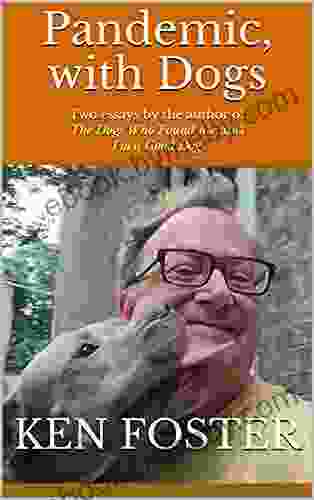
 George Orwell
George OrwellPandemic with Dogs: Two Essays
By Susannah Charleson In the midst of...
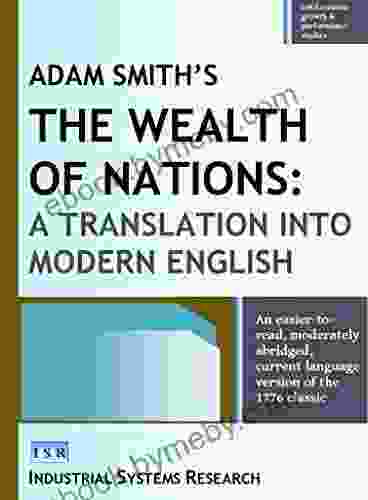
 Leo Mitchell
Leo MitchellAdam Smith's The Wealth of Nations: A Classic Treatise on...
Adam Smith's The...
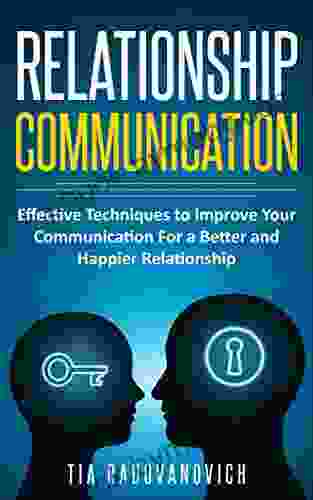
 Cade Simmons
Cade SimmonsUnlock Your Communication Potential: Effective Techniques...
Communication is a fundamental...
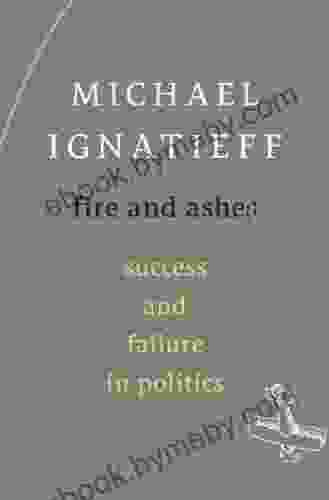
 Floyd Richardson
Floyd RichardsonFire and Ashes: Success and Failure in Politics
Fire and Ashes: Success and...
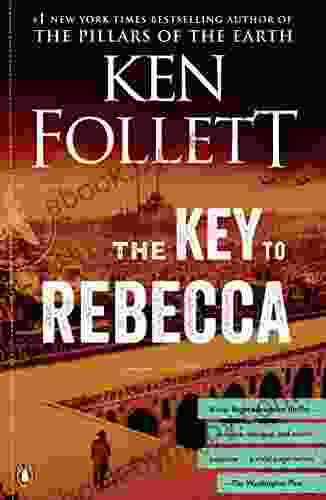
 Oliver Foster
Oliver FosterUnlock the Enchanting Mystery of Ken Follett's "The Key...
Embark on a captivating literary journey into...
4.8 out of 5
| Language | : | English |
| File size | : | 58901 KB |
| Text-to-Speech | : | Enabled |
| Enhanced typesetting | : | Enabled |
| X-Ray | : | Enabled |
| Word Wise | : | Enabled |
| Print length | : | 620 pages |
| Screen Reader | : | Supported |


